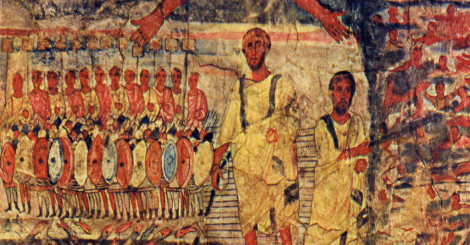
‘Tis the season to throw the word “miracle” around. There are many notions of what constitutes a miracle, and to be honest I’m not entirely certain I have a good working definition. God’s power is certainly involved, but if God is the author of the universe, when is his power not on display in the workings of the world? Given that perspective, I am not overly troubled when I read treatments of miraculous events such as this analysis offering a possible mechanistic explanation for the crossing of the Red Sea. Obviously the intention of the piece is to retell a Bible story without God and replace him with science. Yet how successful can that be if science is just another way of talking about God?
The general premise is that tides created temporary dry land that Moses exploited via precise timing. Even if that is the case, is God not present in the tides? Their regularity and predictability speaks to the stability of the Rock of Ages. The ebb and flow is a picture of how God withholds his judgments for a time, out of mercy and to allow the lost to cross over from death to life, and also of the reality that it will not be withheld forever. The existence of the tides depend on the fact that the sun (and to a lesser extent, the moon) occupies only one spot in the sky; we might wish that all directions are equal, but in reality there is only one Way to follow. Studying the tides and knowing God needn’t have been mutually exclusive options for Moses.
What struck you about this version of Exodus’ biggest action set piece? How do you respond to other descriptions of possible mechanisms for the miracles of the Bible?
Andy has worn many hats in his life. He knows this is a dreadfully clichéd notion, but since it is also literally true he uses it anyway. Among his current metaphorical hats: husband of one wife, father of two teenagers, reader of science fiction and science fact, enthusiast of contemporary symphonic music, and chief science officer. Previous metaphorical hats include: comp bio postdoc, molecular biology grad student, InterVarsity chapter president (that one came with a literal hat), music store clerk, house painter, and mosquito trapper. Among his more unique literal hats: British bobby, captain’s hats (of varying levels of authenticity) of several specific vessels, a deerstalker from 221B Baker St, and a railroad engineer’s cap. His monthly Science in Review is drawn from his weekly Science Corner posts — Wednesdays, 8am (Eastern) on the Emerging Scholars Network Blog. His book Faith across the Multiverse is available from Hendrickson.

Leave a Reply